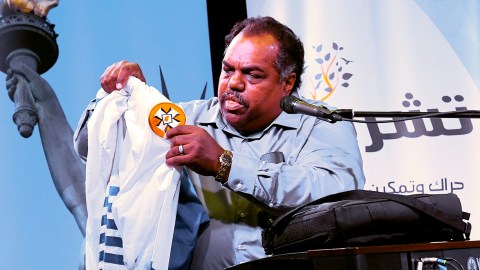It’s Hard to Stay Racist One-On-One, Face-to-Face

Image source: U.S. Embassy Jerusalem/Wikimedia
It’s often said that there’s safety in numbers, and unfortunately, the bromide applies equally to people with hateful attitudes when they operate in groups. Racism, for example, is easy to maintain when surrounded by other haters, but a different matter altogether when a racist is alone with his or her intended victim. At that moment, it’s much harder to ignore the fact that the object of hatred is just another vulnerable human being with the right to be treated respectfully and decently. Author Daryl Davis knows this, and as a black man has been disarming members of the Ku Klux Klan, one by one, since the 1980s by asking each one he meets, “How can you hate me when you don’t even know me?” he tells the Daily Mail. He says he’s gotten over 200 KKK members to quit.
Davis is about to release an updated version of his memoir, Klan-destine Relationships: A Black Man’s Odyssey in the Ku Klux Klan, which describes his experiences.
Davis cites Mark Twain in explaining how all the traveling his family did when he was young gave him a different view of racism, and an unusual patience with the ignorance underlying it: “Travel is fatal to prejudice, bigotry, and narrow-mindedness, and many of our people need it sorely on these accounts. Broad, wholesome, charitable views of men and things cannot be acquired by vegetating in one little corner of the earth all one’s lifetime.”
And Davis has certainly witnessed the damage racism causes everywhere, pointing out, “In Israel, it’s Palestinian versus Jew. In Lebanon, it’s Christian versus Muslim. In Iraq, it’s Sunni Muslim versus Shiite Muslim. In certain African countries, the conflict is tribal. In India, we see a caste system based on the shade of skin color and classicism.”
His approach isn’t without critics who consider his kindness toward racists irksome. “Not all, but most of the criticism has come from black people. I have been called a ‘sellout,’ ‘Uncle Tom,’ ‘Oreo’ and a number of other terrible names.” Davis feels, “This is because [the critics] are engaging in the exact same hateful behavior as they accuse the white racists. I can explain it like this, because I’ve seen it on both sides.”
Davis is a long-time R&B and blues musician — he’s played alongside Chuck Berry and Jerry Lee Lewis, and was friends with the legendary, late Muddy Waters — and music has often been the key to striking up a friendship with a Klan member. “Once when I was performing in a predominantly white venue, a white man approached me on my break and put his arm around me and exclaimed, ‘This is the first time I’ve ever heard a black man play piano like Jerry Lee Lewis.'” To many of us, it’s almost unbelievable that anyone wouldn’t already know the black roots of rock ‘n roll, but such are the filter bubbles in which people live. “I quickly enlightened him as to the origin of Jerry Lee’s music and told him that Jerry Lee had learned that style from black Boogie Woogie and blues piano players. The man did not believe me, despite the fact that I further told him that Jerry Lee was a good friend of mine and he had told me himself where he learned that style.” Davis continues, “He was curious and wanted to learn more about me. Over time, he and I became good friends. He ended up leaving the KKK.”
Davis’ mano a mano approach is not without danger, certainly. “There have been some incidents in which I was threatened and a couple of instances where I had to physically fight. Fortunately, I won in both instances.” He goes on, “At the core of it, although they won’t at first admit it, [racists] express superiority, but truly feel inferiority and in order to elevate themselves, they have to push someone else down.” For Davis, though, the risk has clearly been worth all of the minds he’s changed slowly over the years.
Big Think has written before about people who discover the power in conversation between enemies to develop understanding — check out this article by Maajid Nawaz.
As far as the immediate state of race relations in the U.S. goes, Davis, says, “What you are seeing is those people who were dormant racists, being given a new lease on life by the sentiments of our new President-elect. They celebrate his election. But, let me be clear here. Every racist I know, and I know a lot of them, voted for Trump. However, that does not mean that everyone who voted for Trump is a racist.” So he remains hopeful about our long-term prospects: “There has always been a great deal of racism in the U.S. before and after Obama. However, racism in the US is down, post Obama.”





